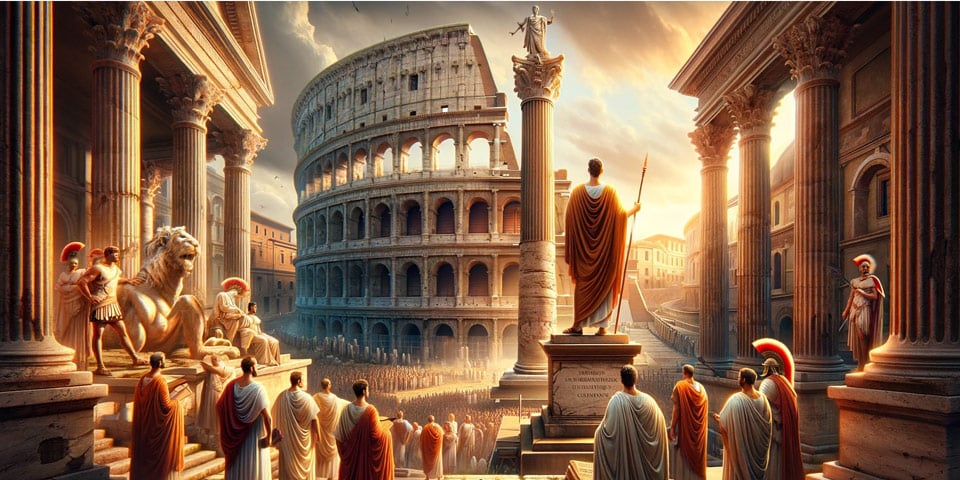

25082 views
Written by: Artur Jakucewicz

In the vast tapestry of global cities, few bear a nickname as evocative as Rome’s – “The Eternal City.” Transcending mere admiration, this epithet has become synonymous with Rome’s enduring legacy.
But what roots this ancient metropolis so profoundly in the realm of eternity? The answer lies not only in its historical and cultural grandeur but also in the timeless narratives woven by poets and the city’s undying spirit. As we explore the origins and perpetuation of this iconic title, we uncover layers of history, myth, and literary eloquence that have cemented Rome’s eternal place in our world’s psyche.
Contents
ToggleThe story of Rome’s inception is as legendary as the city, deeply rooted in mythology and tradition. According to ancient lore, the city owes its name and existence to the twin brothers Romulus and Remus, sons of Mars, the god of war. Rescued and nurtured by a she-wolf after being abandoned on the banks of the Tiber River, these twins symbolize the city’s resilience and destined greatness. The site of their fateful encounter with the wolf, marked by a fig tree, is more than a geographical landmark; it’s a testament to the city’s mythical beginnings. The story reaches its climactic moment when Romulus slays Remus in a blend of ambition and fraternal strife and names the nascent city after himself – Rome.
While a narrative, this myth encapsulates the essence of Rome’s eternal allure – a city born of gods, nurtured by nature, and destined for greatness. This divine and heroic lineage laid the groundwork for the city’s perception as an eternal entity, a concept further solidified by the city’s real-world ascendancy. As Rome expanded from a modest settlement to the heart of a vast empire, its narrative transcended the bounds of mere mythology, embedding itself in the annals of history as a perpetual symbol of power, innovation, and endurance.
The mystique of Rome as the Eternal City was not only a product of its mythological and historical roots but was also profoundly influenced by the literary world. The phrase “Urbs Aeterna,” directly translated to the Eternal City (italian: La Città Eterna), first appeared in the writings of the poet Tibullus.
This depiction was further immortalized by the epic narratives of Virgil and the elegiac verses of Ovid. Virgil, in his monumental work “Aeneid,” ascribed to Rome the phrase “Imperium sine fine” (an empire without end), encapsulating the Roman pride in their city’s unceasing glory. These literary masterpieces did more than glorify Rome; they wove its essence into the fabric of cultural and intellectual history, ensuring its perpetuity across generations and geographical boundaries. The enduring nature of these works, echoing through time, has been instrumental in sustaining Rome’s image as an eternal city, transcending its physical existence.
Read about how to choose a hotel in Rome.
Today, Rome is not a relic of the past but a living testament to its eternal narrative. The city has skillfully intertwined its rich historical tapestry with the threads of modernity, showcasing an unparalleled blend of ancient ruins and contemporary art, traditional cuisines, and evolving culture. This ability to reinvent while preserving its core defines Rome’s eternal character. Its cobblestone streets echo with stories of the past yet pulse with the vibrant rhythm of present-day life.
From the Colosseum’s enduring grandeur to the innovative spirit seen in its museums and galleries, Rome continually demonstrates that while empires rise and fall, a city’s essence can be eternal.
Read about top 30 attractions in Rome.
In conclusion, Rome’s designation as the Eternal City is not a mere romanticized label but a reflection of its uninterrupted historical, cultural, and literary journey. Rome encapsulates the essence of timelessness from its mythical founding by Romulus and Remus to the poetic tributes of Virgil and Ovid and its ongoing evolution in the modern era. As a city continuously reinvented itself while cherishing its rich past, Rome stands as a living embodiment of eternity, captivating the hearts and minds of those who walk its eternal streets.
Author: Artur Jakucewicz
This website uses cookies. For more info read the cookies policy
Rome.us © 2026. Created with love by Roman experts and guides.